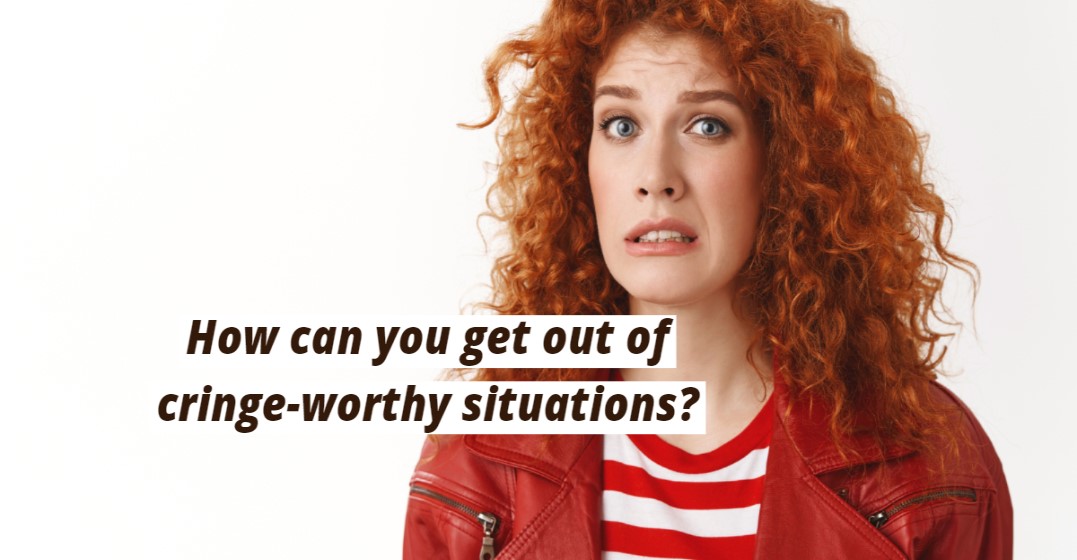6 English words to get you out of cringe-worthy situations
Published on October 1, 2019 / Updated on January 10, 2024
As an English language learner, the last thing you want to do is make a mistake and embarrass yourself in front of a native speaker. Unfortunately, you can’t avoid every embarrassing situation.
So, what do you do when you suddenly find yourself in the middle of a cringe-worthy, or completely embarrassing situation?
Feeling embarrassed because of a mistake on your part is bad enough. If you try to communicate in a foreign language afterwards, it’s easy to forget what to say, which can only make you feel more embarrassed.
Hopefully, memorising these English vocabulary words and phrases now can help you easily get through those situations later.
You’ve probably already heard this one before, but it’s worth repeating. A simple “I’m sorry” can go a long way and can be used in a variety of embarrassing situations.
For example, if you accidentally step on someone’s toe, arrive a few minutes late to a dinner date, or spill something, don’t forget to say “I’m sorry”.
If you feel really badly about your mistake, feel free to emphasise with “I’m so sorry!”
No matter what language you speak, you can’t escape the embarrassment of bodily functions.
If you burp, sneeze, or pass gas (the polite way to talk about farting), you’ll want to follow up with an “excuse me”. Not only does this small phrase help you move away from any embarrassment, but it’s considered to be polite. In fact, you might be seen as rude if you don’t say it.
You’re bound to make a mistake, which can be helpful when you’re learning English. However, some mistakes can lead to embarrassing mix ups. For instance, using the wrong word at a restaurant or during a presentation.
Instead of hiding your face in shame after a mistake, take charge and acknowledge your mistake simply by repeating what you intended to say.
“Sorry! I meant to say that you always look good, not you never look good.”
Whether it’s a certain English word or your wallet, you can’t remember everything. In either case, it’s often easier to just be honest and say “I forgot” to help you deal with the embarrassment.
For instance, if you have trouble remembering a word, you can say, “I forgot the word, but…” and try to move forward with the conversation. This strategy is also helpful when you can’t remember someone’s name: “I’m sorry. I’ve forgotten your name. Could you please tell me again?”
Another good phrase to remember is “I’m drawing a blank,” which means that you can’t recall something. “I’m drawing a blank. What’s her name?”
Think of these words as exclamations you might make after doing something clumsy, such as spilling a drink or dropping something. They can be used interchangeably.
English speakers might say “Oops!” or “Whoops!” as a small indication that their clumsy mistake wasn’t intentional. You could also follow up with “I can’t believe I did that!”
If you’re living, working, or even just visiting another country, you’re bound to encounter unfamiliar customs or cultural norms. This can also lead to a few embarrassing misunderstandings. If you find yourself in the middle of one of those situations, you can say, “I didn’t realise…”
“I’m sorry. I didn’t realise my mistake.”
The most important thing you can do in an embarrassing situation is to not criticise yourself for it. If there’s something to be learned, such as a pronunciation mistake or a cultural lesson, view it as a chance for improvement.
In some cases, embarrassing situations can turn into funny stories, too. So, learn to laugh at yourself as it’s a great way to stop feeling embarrassed.
Head over to the Lingoda website and sign up for your English trial. Our teachers will help you learn new vocabulary, so you, hopefully, won’t encounter too many embarrassing situations again!
